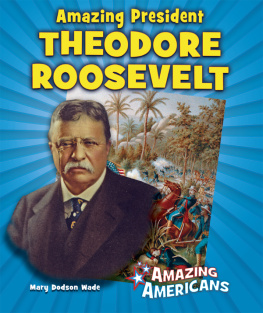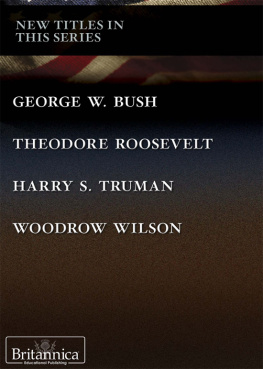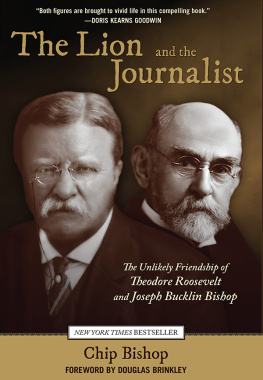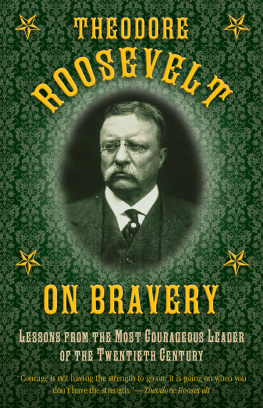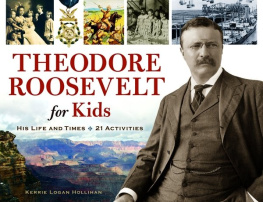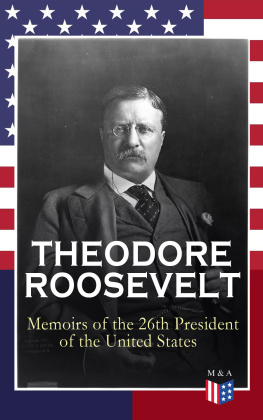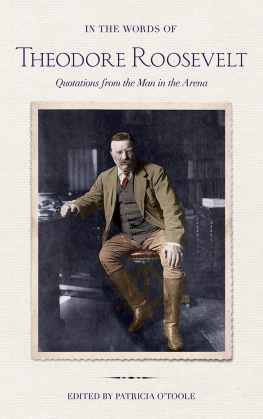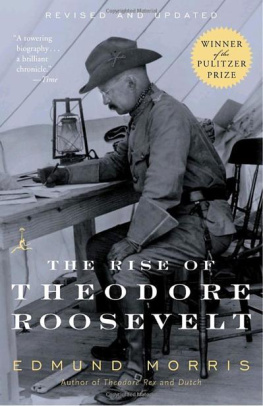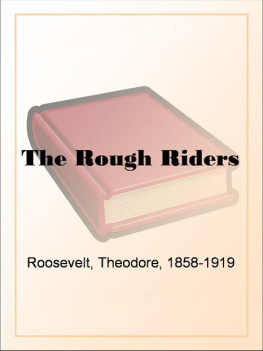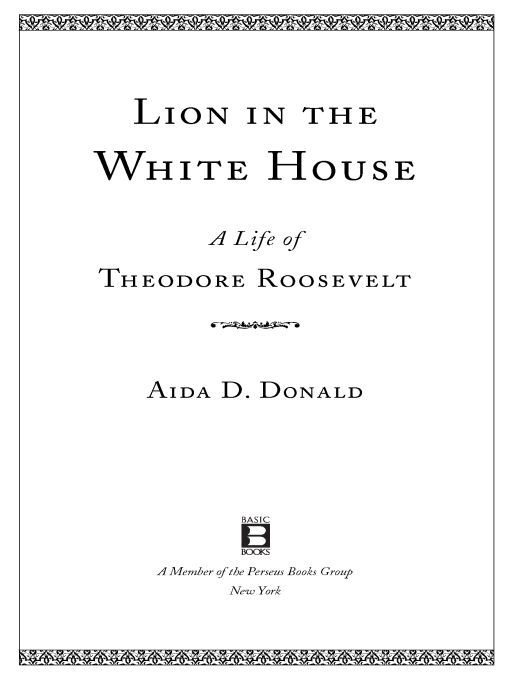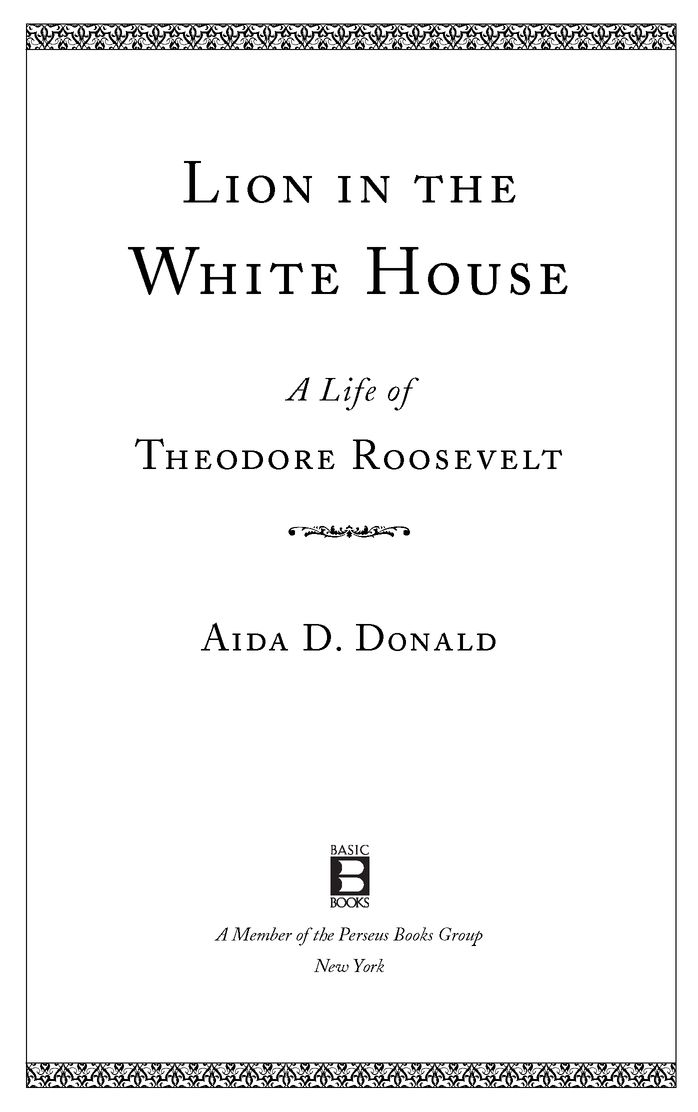Table of Contents
For my family with love
David, Bruce, Jenni, Aleta, Maia
It is not the critic who counts.... The credit belongs to the man in the arena, whose face is marred by dust and sweat and blood; who strives valiantly... who knows the great enthusiasms, the great devotions; who spends himself in a worthy cause; who at best knows in the end the triumph of high achievement, and who at worst, if he fails, at least fails while daring greatly.
THEODORE ROOSEVELT
Introduction
We were following Teddy.... We had been ordered to retreat before that, but it wasnt authenticated. Teddy didnt pay any attention to it anyhow. We went ahead and started up the hill. We got everybody togethercavalry and some infantry.... We went up the hill... it was wide open. We didnt run in a regular line.... It was just like a mob going up there.... We were exposed to the Spanish fire.... Roosevelt went on and overran the trenches, and he was maybe seventy-five yards ahead of ushe was always ahead of us.
THIS IS HOW A SEVENTEEN-YEAR-OLD trooper in Theodore Roosevelts Rough Rider regiment described his leader.
In this account, as in all other stories about Rooseveltand there were scores over the yearshe was his own limelight, as the novelist Owen Wister, who knew him, acutely observed. An incandescent figure, by the age of forty he seemed invincible, with his jutting jaw, too-large teeth, gleaming eyes, spectacles, and a muscular body poised like a cat ready to strike. A steam engine of a man, he had already established a reputation for himself in multiple, and overlapping, realms: writer, cowboy, politician, environmentalist. Now he added soldier. Soon enough, he would add president and world leader to the list. In every realm he mastered whatever task he took on. He was, quintessentially, a reformer in a turbulent age.
Roosevelt was the most popular man in the country when he was president and was the most renowned world figure by the time he retired. Realizing this extraordinary man has always been a challenge. Perhaps it is best to think of his story in three dimensions: the man himself, the national leader, a world leader. The dimensions, happily, allow for a narrative that is chronological.
Roosevelt was born into wealth and position in New York City in 1858. As a child he watched Abraham Lincolns bier pass by his grandfathers mansion in 1865. The martyred president became Roosevelts hero and silent mentor in his public life. He often referred to him in explaining his positions to Republicans and others. During his severest trials, Lincoln was his touchstone.
When he was a boy, Roosevelt was sickly, and how he transformed himself into an athletic and confident man is the stuff of legends. By his twenties, his daunting frame housed an immense intellect and literary talent. His father loved and encouraged him and sent him to Harvard, where he picked up a scientific and secular outlook that guided him in his multiple interests as an adult. On graduating from college, he married the romantic love of his life, but after an idyllic three years, he lost her in childbirth. He gave his infant daughter to his sister to raise and fled to the West to recover from his devastation.
At twenty-three years old, Roosevelt had decided to become a politician, not a usual gentlemans profession. He was elected to the New York State Assembly three times but was thwarted as a reformer. When he returned from the West, after two years of mourning, he picked up his public life, so strong was his call to public service. His sojourn out West, however, was forever imprinted on him. Later, he would make many more trips there. He became a rancher and an early and prodigious environmentalist.
Roosevelt married his dear childhood friend, Edith Carow, in 1886. During the early years of their marriage, he combined his government work with a career as a writer. He alternated between writing ordinary biographies for income and true masterpieces, such as The Winning of the West, which made him small fortunes. He became a civil service commissioner in Washington for six years and then police commissioner in New York City for two years, serving in both posts as a reformer cleaning up corruption. He then became assistant secretary of the navy, where he built a modern American fleet. When war with Spain over Cuba seemed imminent in 1898, Roosevelt resigned to be lieutenant colonel in a regiment he formed called the Rough Riders. He quickly became a heroic warrior in a short and profitable war for America. At forty years old, he was the master of men and a shaper of destinies.
That splendid little war made Roosevelt the popular candidate for governor of New York, despite the fears of Republican Party bosses that he would be independent and too reformist. He was a progressive in his outlook, and he made it clear during his campaign that he intended to improve the lives of working men, break up business monopolies, sever the malign ties business had with political parties, and make the judiciary sensitive to reformist legislation.
As governor, he was a moralist and brilliant manipulator of publicity for causes. He was a magician, too, in his use of the bully pulpit. Roosevelt exhorted the people and government officials to be virtuous. He was sufficiently successful that his tenure in Albany became an apprenticeship for the presidency. New Yorks Republican boss kicked him upstairs to get rid of him. After a brief stint as vice president, he became president when William McKinley was assassinated.
At forty-two years old, Roosevelt was the youngest president in history. His political career, jump-started by a war and hailed by progressives, was astonishingly swift. His ability to bring together high character and purpose attracted Americans. His ebullient and joyful persona entranced voters. Roosevelt brought his country back into the light of the future at a time when the nation most needed it. The sense of high purpose that had mobilized the country during the bloody civil war was now nearly lost. Americans were being diminished and demoralized by a heartless laissez-faire economy that seemed to serve only the industrial barons and financiers.
Roosevelts presidency of little more than seven years, from 1901-9, was the high-watermark of Republican progressivism, national reform, and international success. He refashioned the office of the chief executive and reordered the Republican Party to achieve his ends: the reform of business practices and the empowerment of labor. He broke business trusts to open up economic opportunity to all, mediated strikes, made food and drugs safe, and preserved the environmentand much else as well. In foreign affairs, he added the Roosevelt corollary to the Monroe Doctrine to keep European imperial powers at bay. He built the Panama Canal and rebuilt a powerful navy to secure the country. And he played peacemaker in European and Asian wars, winning the Nobel Peace Prize, the only sitting president to be so honored. He led the nation out of isolation and made it a part of the roiling world that needed a strong and impartial peacemaker.
Roosevelt was the only progressive president in the history of the Republican Party. In fact, Roosevelts presidency was one of the great forward, or progressive, eras in the nations history as a whole. His party never again reached such heights in advanced legislation or in the care of the people. No Republican president since has embraced the idea of creating, through active government, the greatest good for the greatest number of people.


